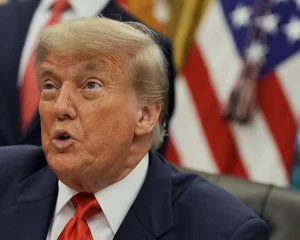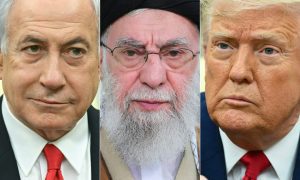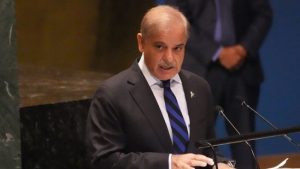Washington D.C. – President Donald Trump‘s latest position regarding Trump on Iran-Israel conflict has sent shockwaves through international diplomatic circles with his declaration that the United States would bomb Iran again “without question” if the nation continues its nuclear programmes. This decisive statement on Trump on Iran-Israel conflict represents a significant escalation in rhetoric as regional tensions continue to intensify across the Middle East.
The President’s uncompromising approach to Trump on Iran-Israel conflict includes explicit demands for Iran to open itself to international inspection to verify cessation of nuclear activities. Trump’s position on Trump on Iran-Israel conflict makes clear that continued uranium enrichment for nuclear projects will trigger immediate military response from the United States, demonstrating his administration’s zero-tolerance policy toward Iranian nuclear ambitions.
This hardline stance on Trump on Iran-Israel conflict comes as missile barrages continue to be exchanged between Iran and Israel, creating an increasingly volatile regional situation that threatens to spiral into broader international conflict.
International Inspection Demands and Compliance

Central to Trump’s strategy regarding Trump on Iran-Israel conflict is the demand for comprehensive international oversight of Iran’s nuclear facilities. The President has explicitly stated his expectation that Iran must submit to thorough international inspection protocols to verify complete cessation of nuclear programme activities.
These inspection requirements outlined in Trump on Iran-Israel conflict discussions represent non-negotiable conditions that Iran must accept to avoid further military strikes. Trump’s position on Trump on Iran-Israel conflict emphasizes that verification mechanisms must be robust enough to detect any attempt to restart nuclear enrichment activities.
Also Read: Trump Slams Khamenei Over His Victory Claims After 12-Day Iran-Israel War
The President’s approach to Trump on Iran-Israel conflict through international inspection demands reflects his administration’s commitment to preventing Iranian nuclear capability development through diplomatic verification backed by credible military threats.
Supreme Court Victory on Birthright Citizenship


Parallel to developments in Trump on Iran-Israel conflict, the Trump administration celebrated a significant legal victory when the Supreme Court ruled that the President’s executive order restricting birthright citizenship could take effect in certain areas. This domestic policy success coincides with Trump’s assertive foreign policy stance on Trump on Iran-Israel conflict and demonstrates his administration’s determination to implement controversial policies despite legal challenges.
The Supreme Court decision regarding birthright citizenship, announced alongside escalating Trump on Iran-Israel conflict developments, will likely limit federal judges’ ability to block presidential policies nationwide. This legal precedent strengthens Trump’s position in implementing both domestic and foreign policy initiatives, including his aggressive approach to Trump on Iran-Israel conflict management.
The timing of this judicial victory provides additional political capital for Trump’s handling of Trump on Iran-Israel conflict as his administration gains momentum on multiple policy fronts simultaneously.
Escalating Regional Warfare


The current phase of Trump on Iran-Israel conflict has witnessed unprecedented levels of military engagement, with sustained missile exchanges occurring across regional borders. Both Iranian and Israeli forces have launched extensive barrages, creating a dangerous escalation spiral that has drawn direct United States military involvement.
Previous US strikes on Iranian nuclear facilities demonstrate the practical implementation of Trump’s threats regarding Trump on Iran-Israel conflict. These attacks targeted Iran’s nuclear programme infrastructure and established precedent for future military action should Iran continue uranium enrichment activities.
The intensity of current Trump on Iran-Israel conflict developments suggests that regional warfare has entered a new phase where traditional diplomatic restraints have diminished significantly, replaced by direct military confrontation between major regional powers.
International Condemnation and Allied Responses


Pakistan and other Iranian allies have strongly condemned US military strikes on Iran, highlighting the international dimensions of Trump on Iran-Israel conflict. These condemnations reflect broader regional concerns about escalating warfare and its potential to destabilize the entire Middle Eastern region.
The international response to Trump on Iran-Israel conflict reveals deep divisions within the global community regarding appropriate responses to Iranian nuclear activities. While some nations support aggressive action to prevent nuclear proliferation, others argue for diplomatic solutions and condemn military strikes as counterproductive.
Regional allies’ criticism of US actions in Trump on Iran-Israel conflict complicates Trump’s strategy and may influence future military planning as the administration weighs international opinion against national security imperatives.
IAEA Tensions and Nuclear Oversight
Iranian parliament’s decision to suspend cooperation with the International Atomic Energy Agency (IAEA) has significantly complicated Trump on Iran-Israel conflict dynamics. Iran’s foreign minister Abbas Araghchi has accused IAEA chief Rafael Grossi of facilitating US and Israeli strikes through his agency’s reporting.


These accusations regarding Trump on Iran-Israel conflict center on an IAEA report issued one day before Israeli strikes that declared Iran was violating nuclear nonproliferation obligations. Iranian officials claim this timing was deliberately coordinated to justify military action.
IAEA chief Grossi has denied that his agency’s reports provided justification for strikes on Iran, but Iranian suspicions about international nuclear oversight continue to influence Trump on Iran-Israel conflict developments and complicate future inspection arrangements.
Nuclear Nonproliferation Violations
The IAEA report that precipitated current Trump on Iran-Israel conflict escalation specifically identified Iranian violations of nuclear nonproliferation obligations. These violations include uranium enrichment activities that exceed permitted levels under international agreements and could potentially support weapons development.
Trump’s response to these violations in Trump on Iran-Israel war context demonstrates his administration’s commitment to preventing Iranian nuclear capability through any means necessary. The President’s willingness to authorize repeated military strikes reflects determination to enforce nonproliferation agreements through force.
International concern about Iranian nuclear activities continues to shape Trump on Iran-Israel war as world powers grapple with balancing diplomatic engagement against military deterrence in preventing nuclear weapons proliferation.
Future Military Action Promises
Trump’s explicit promise to bomb Iran again “without question” if nuclear programmes continue represents the most direct threat yet made in Trump on Iran-Israel war. This unambiguous warning leaves no doubt about US intentions should Iran persist with uranium enrichment activities.
The certainty expressed in Trump’s position on Trump on Iran-Israel war indicates that military planning for additional strikes is already underway, with targets likely identified and attack capabilities positioned for rapid deployment if necessary.
Closing Statements: Unprecedented Regional Crisis
Current developments in Trump on Iran-Israel war represent an unprecedented regional crisis with global implications for nuclear nonproliferation, international law, and Middle Eastern stability. Trump’s uncompromising stance promises continued escalation unless Iran completely abandons its nuclear ambitions.

